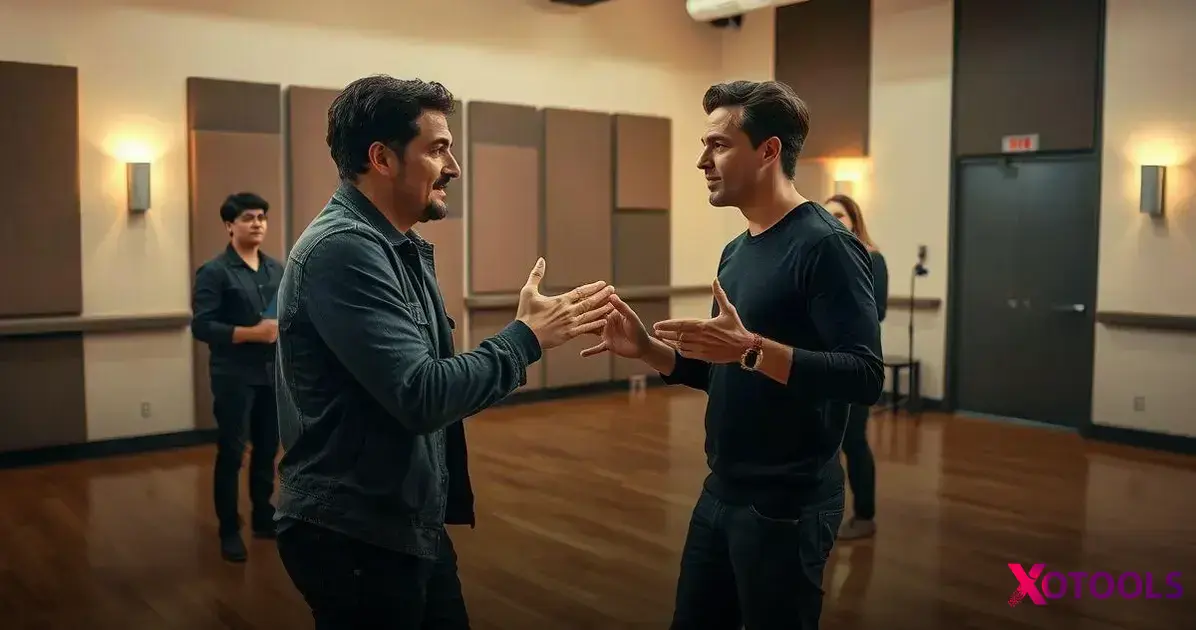ADVERTISEMENT
Top acting tips are essential for anyone looking to elevate their performance and truly connect with the audience. Acting goes beyond memorizing lines; it’s about understanding your character and expressing genuine emotions.
Each actor develops their own approach, experimenting with different techniques and styles to find what works best. Practicing emotional depth and body awareness can make your performance more authentic and compelling.
Collaboration and continuous learning are key to growth in acting. Keep reading to uncover practical insights and strategies that can take your skills to the next level and help you shine on stage or screen.
Understanding Character Development
Understanding character development is key for any actor. A well-developed character has depth and believable traits, which makes the story more engaging. To create an interesting character, start by thinking about their background, emotions, and desires.
Every character needs a goal they want to achieve. This motivates their actions and decisions throughout the story. It’s also important to know their flaws and weaknesses. This helps you portray them more realistically, making the audience connect with their journey.
Finally, consider how your character interacts with others. Relationships can change how we see a character. By showing these dynamics, you create a rich, layered performance that captivates the audience. Remember, great characters make great stories!
Mastering Emotional Range
Mastering emotional range is vital for an actor. It allows you to convincingly portray different feelings, from joy to sadness. When you can express a full spectrum of emotions, your performance feels real and engaging to the audience.
To improve your emotional range, practice identifying your own feelings. Reflect on what makes you happy, angry, or scared. Use these real-life emotions to connect with your character’s feelings. Acting exercises, like improvisation, can help you explore how to express these emotions in various situations.
Finally, observe others and their emotional responses. Watch movies or plays, and pay attention to how actors convey emotions. Notice the small details, like facial expressions and body language. Integrating these techniques will enhance your skills and allow you to connect with your audience more effectively.
Learning Different Acting Techniques

Learning different acting techniques can greatly enhance your skills as an actor. Each technique offers unique approaches to performing a character. For example, the Stanislavski method encourages actors to draw on their emotions and experiences. This helps create a deeper and more authentic portrayal.
Another popular technique is the Meisner method, which focuses on being present and responding truthfully to your scene partner. This technique can improve your listening skills and create a natural flow in dialogue. Experimenting with various techniques will allow you to find the right fit for your acting style.
Additionally, don’t forget about improvisation. This technique improves creativity and adaptability as an actor. It teaches you to think on your feet and react spontaneously. By learning and practicing different acting methods, you’ll become a more versatile performer who can tackle any role!
The Importance of Body Language
The importance of body language in acting cannot be overstated. Body language conveys emotions and intentions without saying a word. A slight change in posture or gesture can reveal a character’s feelings, making the performance more believable. Actors must be aware of their body movements to communicate effectively with their audience.
In each scene, the way you move can enhance your character’s story. For example, crossed arms can show defensiveness, while open hands may indicate trust. Understanding these signals can help you choose the right physical expression for your character. Practice in front of a mirror to see how your body language matches your emotions.
Moreover, watching other actors and how they use body language can provide valuable lessons. Pay attention to their physical choices and how these choices support the dialogue. By developing a strong sense of body language, you can elevate your performances and connect more meaningfully with your audience.
Using Voice Modulation Effectively
Using voice modulation effectively is crucial for every actor. Modulating your voice means changing its tone, pitch, and volume. This skill adds depth to your performance and helps convey a character’s emotions. For instance, a soft, gentle tone can suggest vulnerability, while a loud, commanding voice may express authority or anger.
To practice voice modulation, try reading lines from your script at different speeds and volumes. Experiment with whispering a secret or shouting in excitement. By changing the pace and loudness, you can find what feels right for each moment in your performance. Remember, the way you say something can be as important as the words themselves.
Additionally, pay attention to the emotional context of each scene. Your voice should match the feelings of your character. If the moment is tense, consider lowering your voice to build suspense. If it’s joyful, let your voice rise with enthusiasm. Mastering voice modulation will enhance your acting and keep your audience engaged throughout.
Improving Scene Performance

Improving scene performance is essential for every aspiring actor. Each scene is an opportunity to bring your character to life and tell a story. Start by understanding the objective of your character in that scene. What do they want? Knowing this will help you make choices that will influence your performance and keep it engaging.
Next, focus on your interactions with other characters. Listening and reacting is just as important as your lines. Build chemistry and connection with your scene partners. This makes the performance feel more authentic and allows for moments of surprise and spontaneity, which can greatly enhance the overall impact of the scene.
Finally, practice makes perfect! Rehearse your scenes regularly to build confidence. Try different approaches to see what works best. Record yourself performing and watch the playback. This can help you spot areas for improvement and refine your acting choices. Always be open to feedback, as this will help you grow as an actor and improve each scene you perform.
Practicing Audition Skills
Practicing audition skills is key for every aspiring actor. Auditions can be nerve-wracking, but preparation can help calm those nerves. Start by selecting a monologue that showcases your strengths. Make sure the piece is well-suited for your age and type. Practice it several times to understand the character and emotions involved.
Next, try auditioning in front of friends or family. Ask for honest feedback to see how they connect with your performance. This will help you build confidence and make adjustments based on their reactions. Recording your auditions can also be helpful. Watching yourself perform will allow you to notice areas where you can improve, such as body language or voice modulation.
Finally, familiarize yourself with the audition process. Research what to expect in a real audition setting, like how to read sides or deliver cold readings. Attend workshops or classes to get tips from experienced actors and casting directors. The more you practice these skills, the more prepared you will be when the opportunity arises.
Building On-Screen Chemistry
Building on-screen chemistry is important for creating believable performances. When two actors share a strong connection, it draws the audience into the story. To achieve this, spend time getting to know your scene partner. Talk with them about their character and objectives. This helps develop trust and understanding, which enhances the dynamic on screen.
Another way to foster chemistry is through rehearsal. Practice the scene together several times. This allows you to explore the emotional depth and the physicality of your characters. Pay attention to how you react to each other’s choices, and don’t be afraid to experiment. True chemistry often comes from spontaneous moments during rehearsals.
Lastly, remember that body language plays a huge role in chemistry. Simple gestures, like a shared smile or a meaningful look, can add layers to your performance. Be open and respond to your partner’s energy. The more you connect emotionally and physically, the more the audience will feel the chemistry between your characters.
Finding Your Unique Acting Style

Finding your unique acting style is a journey that every actor must take. Start by exploring different techniques to see what resonates with you. Attend various acting classes, workshops, or even watch performances by established actors.
Pay attention to the methods they use, and think about what feels natural to you. Remember, there is no right or wrong way to act; it’s about discovering your own voice.
Once you’ve explored different techniques, begin to refine your approach. Practice regularly and identify what aspects of your performances make you feel confident. Is it your ability to connect emotionally with a character? Or how you use body language? Focus on these strengths and incorporate them more into your acting. This will help you develop a style that feels genuine and true to who you are.
Lastly, seek feedback from trusted friends, teachers, or mentors. They can offer insights into your performances that you might not notice. Use their input to evolve your style further. Over time, you’ll notice that your unique acting style will shine through, making your performances memorable and authentic.







